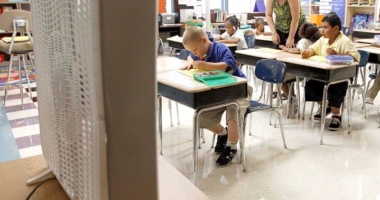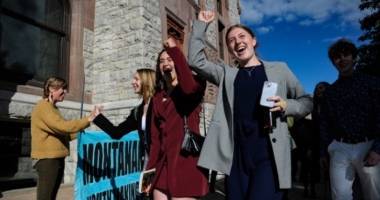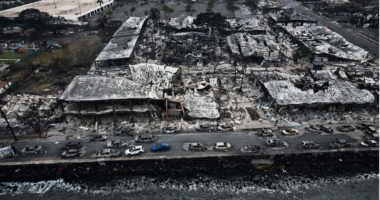Climate, Health and Equity Brief
EPA rules and lifestyle choices: Change is hard
May 15, 2023

The Climate, Health & Equity Brief is GMMB’s take on the last two weeks’ news on the current impacts of climate change. If you haven’t subscribed yet, you can do so by clicking here.
Hot Topic: Tough choices. The Environmental Protection Agency (EPA) proposed ambitious new emissions limits on U.S. power plants this week—a decisive and important move that could take a sizable bite out of harmful U.S. greenhouse gas emissions if adopted. Predictably, Sen. Joe Manchin (D-WV) and congressional Republicans raged against the proposed rules, which will face a contentious legal battle from Republican attorneys general and legislative challenges from GOP lawmakers in the weeks ahead.
As climate battles rage in Washington, similar struggles are taking place on an individual level around the world as awareness about climate change clashes head-on with ingrained lifestyle choices. Several recent reports on individual behavior change in the face of the climate crisis reveal both challenges and opportunities.
In Europe, a study found that a majority of citizens in the seven countries surveyed are concerned about climate change and want more aggressive action to solve it. However, most are reluctant or unwilling to take personal steps to reduce their carbon footprints if doing so would have a measurable impact their lifestyles, such as buying only secondhand clothes or eliminating meat from their diets.
Another study that scored American adults on their likelihood to make sustainable purchasing choices found that women, people of color, city dwellers and people aged 18-39 are the most likely to buy sustainably. Lagging behind them—in some cases by frustratingly wide margins—are men, suburban and rural residents, whites, and people 40 and older.
And a third study out of Australia helps to explain part of that gap, finding that many men who personally identify as masculine may resist making the switch to a vegetarian diet because eating meat makes them feel more “manly,” while eliminating it would threaten their masculinity.
The results of these studies highlight the innate challenge to broader society: Even small changes are easier said than done, particularly in the face of ingrained cultural norms. And the battles in Washington show that even common-sense emission reductions that will limit pollution, improve air quality and help tackle the climate crisis are never a given, particularly in our polarized society. There is no question that change is hard at any scale, but with so much at stake, change has never been more necessary—and it will pay dividends to humanity for lifetimes to come.
Human Health
Summer heat dangers in cities like Phoenix, AZ are becoming more familiar nationwide as average temperatures soar, with areas as disparate as the Pacific Northwest, Chicago and North Carolina facing mounting heat-related deaths, particularly among the elderly. (AP)
COP28 Chairman Sultan Al Jaber announced that the next UN climate summit in Dubai will be the first to dedicate a full day to highlighting the consequences of the climate crisis on human health. (The Guardian)
At least 400 people have died in the last week from floods and landslides following heavy rains in the Democratic Republic of Congo’s South Kivu province—one of the locations the World Bank predicted will have more extreme weather disasters because of climate change. (CNN)
Rising sea levels, cyclones and floods have pushed salt water into the rivers and streams of Bangladesh, increasing the salinity of these critical water sources to levels that can increase hypertension and preeclampsia in pregnant women as well as high blood pressure, skin diseases, diarrheal diseases and outbreaks of cholera. (NBC News)
Planetary Health
All-time high temperatures were recorded last week in three South Asian countries, including Vietnam (112°F), Laos (110°F) and Thailand’s capital (109°F), raising increasing concern in a region where studies show days of ‘extremely dangerous heat’ could double in the coming decades. (CNN)
New research showed that the emissions from the Australian wildfires in 2019 and 2020 may have helped trigger the unexpected and long-lasting cool phase of the three-year La Niña that intensified droughts in Eastern Africa and hurricanes in the Atlantic. (Inside Climate News)
Equity
Three years behind schedule, wealthy nations are finally expected to make good this year on their commitment to transfer $100 billion annually to developing countries experiencing increasingly severe climate impacts—a sum that still falls far short of poor nations’ actual needs. (Reuters)
The Department of Housing and Urban Development will provide $837.5 million in grants and $4 billion in loans to owners of low-income housing for upgrades like rooftop solar and heat pumps that make their rental properties more efficient and reduce energy and water bills for renters. (The Washington Post)
Politics & Economy
The EPA proposed the strictest-ever rules limiting emissions from all existing and new U.S coal and gas-fired power plants, which generate nearly 25% of U.S. greenhouse gas pollution—though the proposal almost certainly faces a legal battle with Republican attorneys general and legislative challenges from GOP lawmakers. (AP)
One day before the EPA’s rollout of its new carbon emission standards for power plants, Senator Joe Manchin announced that he would oppose all nominees for open EPA posts unless the Biden administration halts its “radical climate agenda.” (Reuters)
Ajay Banga was confirmed as the next president of the World Bank as the financial institution prepares to potentially unlock trillions of dollars to help finance climate adaptation measures in developing nations. (AP News, The New York Times)
The US beef industry—producer of the world’s most emissions-intensive food products by a wide margin—is engaging in an “all-out PR war” with the launch of a new Masters of Beef Advocacy program that trains spokespeople to downplay the industry’s massive carbon footprint. (The Guardian)
A ballot proposition in El Paso, TX which sought to establish a goal of 100% renewable energy by 2045 was overwhelmingly rejected after opponents of the charter, primarily fossil fuel interests, funneled more than $1 million against the initiative. (Inside Climate News)
Life as We Know It
A new predictive model that scores American adults on their likelihood of buying sustainably reveals that women, people of color, city dwellers and people aged 18-39 are more likely to make sustainable choices than men, suburban and rural residents, whites and people 40 and older—in some cases by wide margins. (POLITICO)
A survey of seven European countries found that most citizens are worried about climate change and want climate action yet are hesitant to take personal steps that will impact their lifestyles, such as buying only secondhand clothes, eliminating meat from their diets or having fewer children. (The Guardian)
New research found that Australian men who identified as more masculine were less likely to consider reducing their meat consumption or considering veganism and more likely to believe that eating meat is natural and necessary. (IFLScience)
Farmers in Uganda, one of Africa’s biggest coffee-exporting countries, are growing a new, more heat-resistant variety of coffee called liberica excelsa to supplement arabica and robusta varieties that are increasingly threatened by rising temperatures and pests. (The New York Times)
Using a commercial gas leaf blower for one hour produces emissions equal to driving from Denver to Los Angeles—a fact driving Denver-area regulators to consider joining California, DC and Vermont in adding restrictions on gas leaf blowers and lawnmowers because of their shocking level of emissions. (USA Today)
Action
New York passed several landmark measures that will shift the state away from fossil fuels and shape its energy sector, including banning natural gas and fossil fuels in new buildings, establishing a cap-and-invest program and authorizing the state’s public power utility to act as a developer of renewable power facilities. (E&E News)
Greenpeace Italy and ReCommon are suing Italian oil company Eni for greenwashing and lobbying for more fossil fuels despite having known about the risks its product posed since 1970, the first such lawsuit in the country. (The Guardian)
Kicker
Contemplating the environmental impact of your personal choices? Check out this column, which gives evidence-based advice on what matters most to protect the planet, the climate and each other. (The Washington Post)
A society grows great when old men plant trees in whose shade they shall never sit.”
– Greek Proverb
The GMMB Climate, Health & Equity Brief would not be possible without the contributions of the larger GMMB team— Aaron Benavides, Thomas Baer, Stefana Hendronetto, Sharde Olabanji, and Quincy Tichenor. Feedback on the Brief is welcome and encouraged and should be sent to CHandEBrief@gmmb.com.

)




